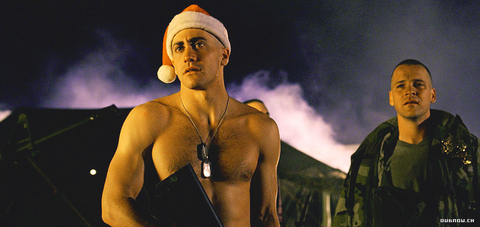"Thank God," says an exultant marine at the end of this story of the first Iraq war, "we'll never have to come back to this shithole ever again!" Sam Mendes's gleamingly accomplished and controlled screen version of Anthony Swofford's military memoir allows its historical ironies to float some way up to the surface, before sinking enigmatically back down again. With cinematographer Roger Deakins and editor Walter Murch, Mendes heads up a triple-A-team of filmmaking and Jarhead is something which is stunning to look at and to listen to, with elegantly chosen pop songs unspooling on the soundtrack under each fresh new horror.
Swofford is a 20-year-old soldier in the US Marine Corps during the 1991 Gulf War, played by Jake Gyllenhaal, an actor who here bulks up in maturity and presence: Swofford's future literary sensibilities are signalled with a battered copy of Camus' The Stranger which, to his embarr-assment, he is discovered reading on the lavatory by his drill sergeant, and through his deadpan voiceover, introducing us to each of the bizarre episodes.
Swofford endured all the brutal privations and initiations -- including having his head shaved into the "jarhead" cut -- and was then shipped out to the burning Saudi desert, where he and his comrades experienced an unending Beckettian nightmare of doing nothing in the 100℃-plus heat. Then, when the shooting war finally got underway, Swofford found that, as glorified infantry, the marines were virtually redundant as the hi-tech planes and computer-guided bombs flashed overhead. Even when he has a chance of real action as a sniper, this too is to lead nowhere.

PHOTO COURTESY OF FOX MOVIES
It is Groundhog D-day: a study of bafflement and frustration and disillusion, a study of nothing happening nearly all the time. It is an anti-war-movie in the sense that it reverses and confounds the conventional demands for exciting celluloid war action. This has caused some puzzled head-shaking among US critics on its US release last year. They are missing the point. Professional soldiers testify that a lot of their existence in the field of battle is spent going out of their heads with boredom. Military life does not guarantee to satisfy the narrative demand for confrontation. More than this, Jarhead reminds us of the dangerous lesson that the first Iraq war appeared to teach, and on which the current military adventure was partly founded -- that Saddam's Iraq can be defeated painlessly, in a hi-tech daze.
Swofford finds that the real drama is the male rage among his comrades. His sniper-partner Troy, played by the sleepy-eyed Peter Sarsgaard, has an awful secret about his civilian life. His drill sergeant Sykes (Jamie Foxx) is not merely a traditional screamer-7cm-from-the-face but a whim-sical satirist who forces Swofford to imitate bugling reveille without a bugle. His platoon disgrace themselves with a group nervous breakdown in front of a TV crew when Sykes sadistically makes them play touch football wearing chemical masks in the brain-frying heat. Finally, they chance upon the horrific mass death of refugees on the Basra road. They are forced to absorb both the frustration of not engaging the enemy and the horror of being associated with this wholesale slaughter of civilians.

May 18 to May 24 Pastor Yang Hsu’s (楊煦) congregation was shocked upon seeing the land he chose to build his orphanage. It was surrounded by mountains on three sides, and the only way to access it was to cross a river by foot. The soil was poor due to runoff, and large rocks strewn across the plot prevented much from growing. In addition, there was no running water or electricity. But it was all Yang could afford. He and his Indigenous Atayal wife Lin Feng-ying (林鳳英) had already been caring for 24 orphans in their home, and they were in

On May 2, Chinese Nationalist Party (KMT) Chairman Eric Chu (朱立倫), at a meeting in support of Taipei city councilors at party headquarters, compared President William Lai (賴清德) to Hitler. Chu claimed that unlike any other democracy worldwide in history, no other leader was rooting out opposing parties like Lai and the Democratic Progressive Party (DPP). That his statements are wildly inaccurate was not the point. It was a rallying cry, not a history lesson. This was intentional to provoke the international diplomatic community into a response, which was promptly provided. Both the German and Israeli offices issued statements on Facebook

President William Lai (賴清德) yesterday delivered an address marking the first anniversary of his presidency. In the speech, Lai affirmed Taiwan’s global role in technology, trade and security. He announced economic and national security initiatives, and emphasized democratic values and cross-party cooperation. The following is the full text of his speech: Yesterday, outside of Beida Elementary School in New Taipei City’s Sanxia District (三峽), there was a major traffic accident that, sadly, claimed several lives and resulted in multiple injuries. The Executive Yuan immediately formed a task force, and last night I personally visited the victims in hospital. Central government agencies and the

Australia’s ABC last week published a piece on the recall campaign. The article emphasized the divisions in Taiwanese society and blamed the recall for worsening them. It quotes a supporter of the Taiwan People’s Party (TPP) as saying “I’m 43 years old, born and raised here, and I’ve never seen the country this divided in my entire life.” Apparently, as an adult, she slept through the post-election violence in 2000 and 2004 by the Chinese Nationalist Party (KMT), the veiled coup threats by the military when Chen Shui-bian (陳水扁) became president, the 2006 Red Shirt protests against him ginned up by